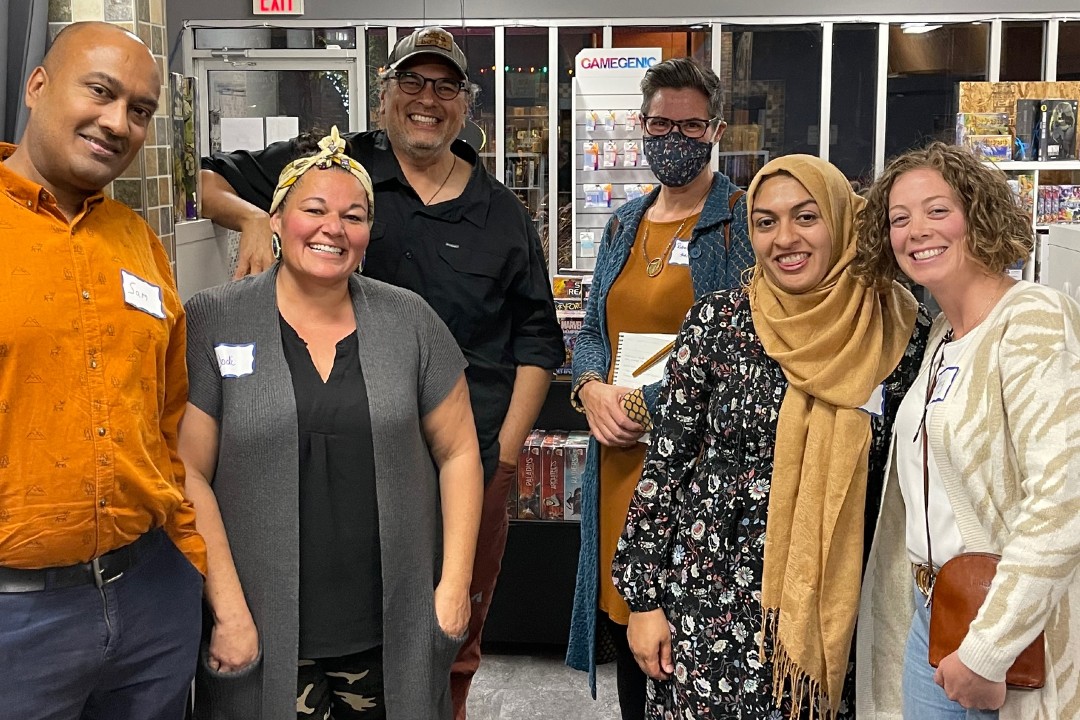After receiving accolades and financial support from the United Nations, a team that includes the Yellowhead Indigenous Education Foundation, the Indigenous Knowledge & Wisdom Centre, and the Edmonton Shift Lab is gearing up for a wider retail launch of its board game focused on Treaties.
"Because of all the pieces involved, we want to make sure everything's 100% done perfectly well," Sam Singh, a co-founder of the now-shuttered Shift Lab project from Skills Society, told Taproot about Exploring wâhkôhtowin. "Our plan is it'll be out in 2025."
With gameplay designed by Roberta Taylor, Exploring wâhkôhtowin is already playable for free online through Tabletopia. Two to four players traverse the board collecting cards that tell stories about Indigenous-settler relations in history that honour "the spirit of friendship in which the original treaties were signed," reads the Tabletopia page.
"Our intention was to focus on: What does it mean to be a Treaty partner? What does it mean to embody Treaty, currently?" Jodi Calahoo Stonehouse, the former executive director of Yellowhead Indigenous Education Foundation and current Alberta New Democratic Party MLA for Edmonton-Rutherford, told Taproot.
Calahoo Stonehouse is a Cree and Mohawk woman from Michel First Nation who was a key collaborator on the project. "We found that there was a missing gap around how we got where we are as Indigenous peoples," she said. "This board game really is meant to be an interactive, accessible way to look at the history of legislation, colonialism policy, and agreements."
Exploring wâhkôhtowin dates back to work that Shift Lab started in 2016, and eventually became one of its three anti-racism prototypes. Shift Lab used systems- and design-thinking to develop the game with the partners, and much of the work took place at Skill Society's Action Lab. The game was funded by the Edmonton Community Foundation, the province, the Edmonton Heritage Council, and the Canadian Race Relations Foundation. Its name, "wâhkôhtowin," refers to "the kinship interwoven in relationships, communities, and natural systems."
Years after work on it started, the game is now receiving global attention. In November, Singh travelled to Portugal for the United Nations Alliance of Civilizations Global Forum, where Exploring wâhkôhtowin was one of 10 projects selected from about 1,800 applicants for recognition by the Intercultural Innovation Hub.
That hub will now provide the Yellowhead Indigenous Education Foundation with a US$20,000 grant, as well as one year of capacity-building and mentorship support to help the game grow.
Singh said the physical version of the board game will be distributed through Pe Metawe Games, an Indigenous-owned game store.

Game collaborators (from left) Sam Singh, Jodi Calahoo Stonehouse, James Knibb-Lamouche, Roberta Taylor, Rabia Naseer, and Tiffany Smith gather during a testing event for the Exploring wâhkôhtowin board game. The game tells Treaty stories and will have a retail launch in 2025. The group includes representatives from Skills Society's Edmonton Shift Lab, the Indigenous Knowledge & Wisdom Centre, and the Yellowhead Indigenous Education Foundation. (Supplied)
Aimed at players aged 14 and older, Exploring wâhkôhtowin is currently being introduced in classrooms, Singh said.
"We've had school teachers and curriculum developers across Treaty 6 (try the game) — Edmonton Public, Edmonton Catholic, some of the Indigenous programs like Braided Journeys at Edmonton Catholic," he said. "We've had two professors of Indigenous history, one from the University of Saskatchewan, one from the University of Manitoba, who have tried it out as well, and they've all given us good feedback."
The team is continuing to make tweaks and additions to the game before the retail release. "We're still incorporating that feedback to make it as robust and as educating and entertaining as possible," Singh said.
Calahoo Stonehouse and Singh said another perk of recognition from the UN is that it will increase awareness of the game as it nears wider production. Plus, Calahoo Stonehouse said, history continues to be made and influence the way we engage with one another, and reminders of that are built into the game's player experience.
"When you are using not only your mind but also your body and your tactile (sense), you are embodying the process of these experiences by reading, thinking, talking, moving," she said. "It's about how can we fully engage people into recognizing that this history exists on this land. But it still is part of our identity today."
Singh said one reason the Intercultural Innovation Hub recognized the game is because it's "scalable and sustainable."
On that front, Calahoo Stonehouse added that there's potential for an adapted version of the game for other regions in the future. "It could be modified to other stories where colonialism and legislation are perpetuating genocide on a people," Calahoo Stonehouse said. "It's really a model that can be modified, adapted, and transformed."
For those unfamiliar, the same point on genocide is made in paragraph one of the Truth and Reconciliation Commission's final report, published in 2015.
Calahoo Stonehouse also said she's been uplifted to see the game reach people.
"One of the most beautiful gifts that I've witnessed as an Indigenous person is having my colleagues who are non-Indigenous really lift and push this work, and make sure that it gets to kids and families," Calahoo Stonehouse said. "That is anti-racism, and that is allyship. "That is being a Treaty relative and a Treaty partner, and I'm very thankful for that."
Singh said there's a growing interest in Indigenous games and a board game "boom" in general. He also said he met some Peruvians working on an educational board game about Indigenous peoples in that country during his trip to Portugal. Here at home, the aforementioned Pe Metawe Games carries Indigenous-made titles such as Coyote & Crow. In a similar vein, the Indigenous Knowledge & Wisdom Centre offers a box of educational products called a Treaty Kit. It includes books, a puzzle, and more.
